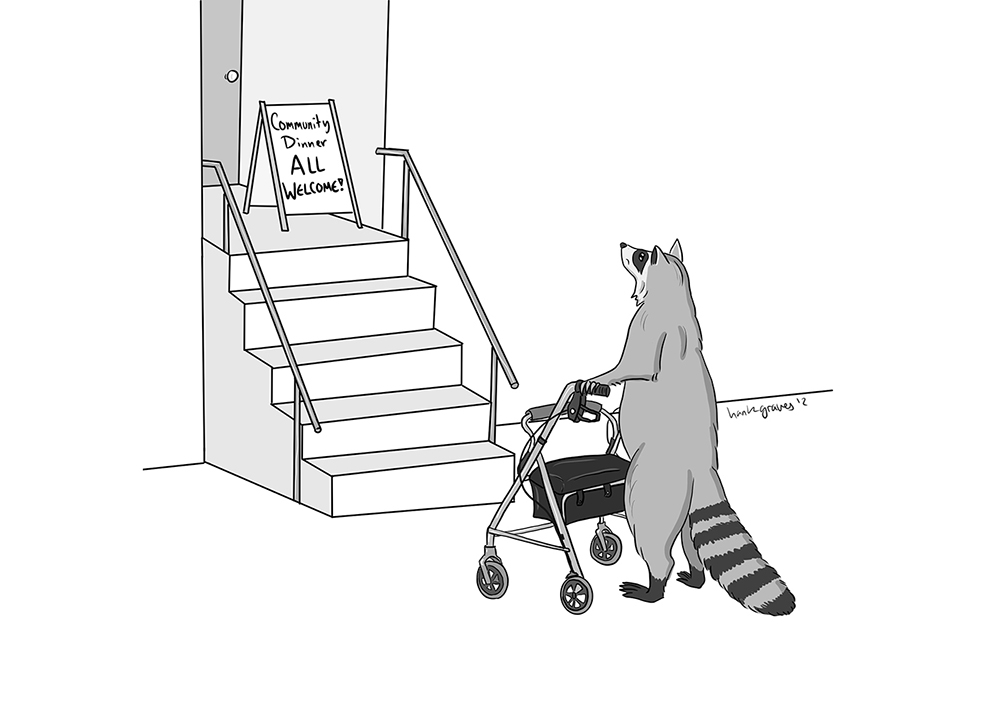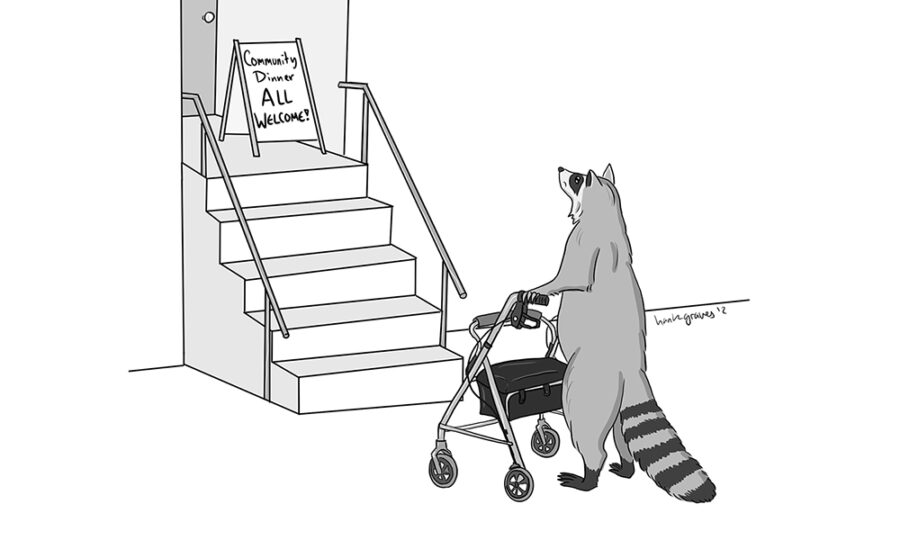This is the final installment of “Power and Pleasure at the Dinner Table.” Find part 1, An Invitation, part 2, The Party Table, and part 3, The Community Table, in previous posts.
I intuitively feel the pull of how eating together can be pleasurable, a site of connection. Yet I suspect many of us likely have examples of exclusion when it comes to sharing food with others. Sometimes feelings of exclusion indicate opportunities for new experiences, such as being an omnivore at a vegan potluck. However, exclusion might indicate relations of domination. The third table is one characterized by inaccessibility.
Sunaura Taylor on inaccessibility and shared meals
In Beasts of Burden: Animal and Disability Liberation, Sunaura Taylor explores how to navigate shared meals and lines of exclusion in reflecting on an experience she had as an invited speaker at an art event called “The Feral Share.” For those of you unfamiliar with Taylor, she is an interdisciplinary artist and scholar whose work examines the intersection of social justice, environmental studies, disability studies, and animal studies.
The Feral Share event was, in Taylor’s words, “one part local and organic feast, one part art fund-raiser, and one part philosophical exercise” (p. 149). She had been invited as part of the dinner “entertainment” to represent a vegan position in a debate on the ethics of eating animals.
Many aspects of the event were exclusionary and alienating for Taylor. First, the art segment of the evening was held in part of the building that was not accessible to her wheelchair. Second, the menu was beef or cheese ravioli. Taylor and her partner were provided a vegan meal, but not having a vegan option on the regular menu sent a particular message to the audience about what choosing vegan eating entails, in terms of pleasure and fitting in.

Ableism and animal exploitation
About the debate itself, Taylor states:
I had previously decided that trying to talk about disability as it relates to animal issues would not be possible. But after being in that inaccessible space, I felt compelled to discuss it. I felt a responsibility to represent disability and animal issues to the best of my ability—to represent a model of disability I politically agreed with in the hope that some of the marginalization I had experienced would be acknowledged by others. (p. 154)
Taylor isn’t convinced she succeeded. In drawing connections between ableism and animal exploitation, some members of the audience felt as if Taylor were comparing herself to an animal. To call a disabled person an animal is harmful and denies their dignity. Such comparisons also exemplify two widespread beliefs: that humans are better than animals, and that human dignity is expressed primarily in our rational capacities. For Taylor, these beliefs are false. Reclaiming disability is about reclaiming the body and a human connection to animality; that is, reclaiming embodied vulnerability, interdependence, and care as central features of the human condition.
As audience members expressed discomfort, Taylor is unsure to what degree this part of her message was understood. She wonders whether she should have caused more of a fuss at the dinner table. Would pressing for accommodations, which might be interpreted as “being difficult,” or would refusing to participate in an inaccessible event been better options?
Complaints as disruption and solidarity
Feminist philosopher and lover of tables Sara Ahmed (2024) reflects on how complaints can function as both disruption and solidarity. Although the status quo is directly challenged, those challenges can serve as calls for solidarity and transformational change. The dual nature of raising complaints at a table reminds me of Arendt’s insistence that democracy depends on pluralistic viewpoints. Plurality means that everyone at the table won’t always agree. It won’t always be fun or pleasurable to be at the table together. And, Taylor’s story encourages us to ask whether raising complaints might be a way to show how some people, and some desires, have not been given seats at the table.
A philosophy that begins with the gut
I hope this evening has been pleasurable for you. Throughout our table tour, I have praised desire as a source of knowledge and connection. It can be an aspect of human curiosity and emphasize human neediness.
Although desiring is a natural activity for humans, the content of our desires is not naturally given, at least not entirely. Desire is partially conditioned by dominant norms. Take carnism, a term psychologist Melanie Joy (2022) develops to refer to “the invisible belief system, or ideology, that conditions people to eat certain animals” (np). Some people desire to eat animals, but this desire is not a natural fact of being human. Moreover, desiring something or loving it does not justify exclusions or harms.
Philosophy that begins with the gut, the nose, and the tongue helps us appreciate Alcibiades’ lusty philosophical wisdom: that pursuing wisdom means embracing the messiness of our embodied desires. In addition, philosophy from the gut offers potential for fostering political belonging.
As Arendt emphasizes, tables gather people together, yet recognize that we are differently positioned. When we disagree around a table, we have the opportunity to reflect: Are we attentive to exclusions? Are we making space for tastes that may challenge our own? When situated within a relational framework, the pleasure of eating together can be a way to forge bonds of trust with others rather than a mode of self-centered consumption.
As a metaphor for human togetherness, I think the table is better with food on it.
As Boisvert states,
Since we are embodied creatures, linkages do not simply arise from acts of disembodied will. In a concrete, practical sense, they depend on common activities usually accompanied by some physical mediating device that touches all the participants. (p. 147)
Sharing meals captures what it means to be human: that we are embodied, desiring creatures who experience pleasure in coming together around a table. Shared food may be messy, and may be uncomfortable, at times. But give it time, and I think we will all be satisfied—at least until the next meal.
References for “Pleasure and Power at the Dinner Table”
Ahmed, Sara. “Setting the Table, Some Reflections on Why Tables Matter.” Feminist Killjoys Blog. 28 June 2024. https://feministkilljoys.com/2024/06/28/setting-the-table-some-reflections-on-why-tables-matter/ Accessed July 8, 2024.
Arendt, Hannah. The Human Condition. Chicago: Chicago University Press, 1958.
Arendt, Hannah. Lectures on Kant’s Political Philosophy. Ed. Ronald Beiner. Chicago: University of Chicago Press, 1992.
Boisvert, Raymond D. I Eat, Therefore I Think: Food and Philosophy. Madison and Teaneck: Fairleigh Dickinson University Press, 2014.
Frede, Dorothea and Mi-Kyoung Lee, “Plato’s Ethics: An Overview”, The Stanford Encyclopedia of Philosophy (Winter 2023 Edition), Edward N. Zalta & Uri Nodelman (eds. https://plato.stanford.edu/archives/win2023/entries/plato-ethics/.
Helm, Sally and Dan Pashman. “The Trouble with Table 101.” Planet Money. National Public Radio. 29 January 2020. https://www.npr.org/2020/01/22/798594109/episode-968-the-trouble-with-table-101/ Accessed July 8, 2024.
Lorde, Audre. Sister/Outsider. Berkeley: Crossing Press, 1984/2007.
Joy, Melanie. “What is Carnism?” https://carnism.org/carnism/ Accessed June 21, 2024.
Marcano, Donna-Dale. “Re-Reading Plato’s Symposium through the Lens of a Black Woman.” In Reframing the Practice of Philosophy: Bodies of Color, Bodies of Knowledge. Ed. George Yancy. pp. 225-234. State University of New York Press, 2012.
Plato. The Symposium. Trans. Alexander Nehamas and Paul Woodruff. Indianapolis & Cambrdge: Hackett, 1989.
